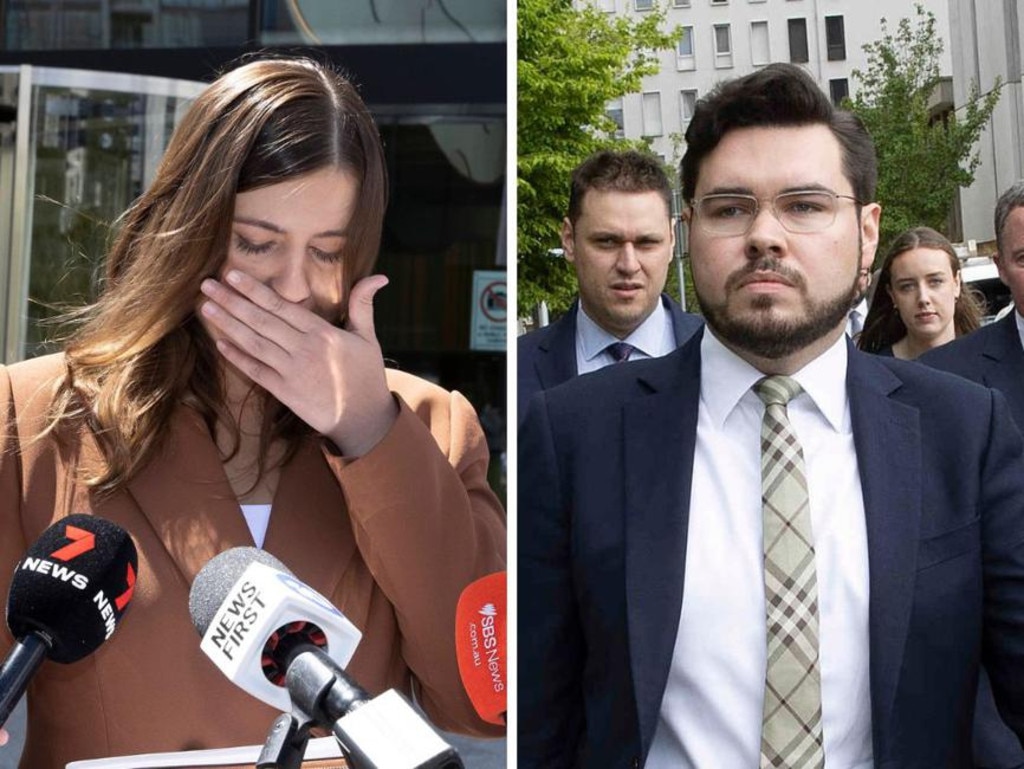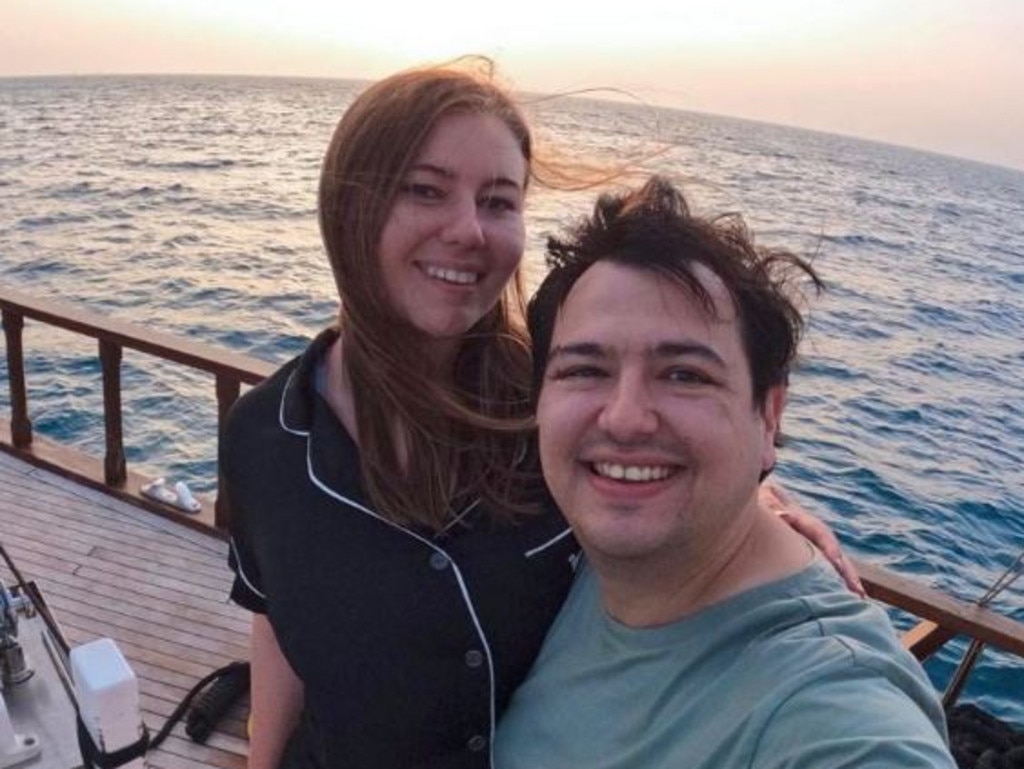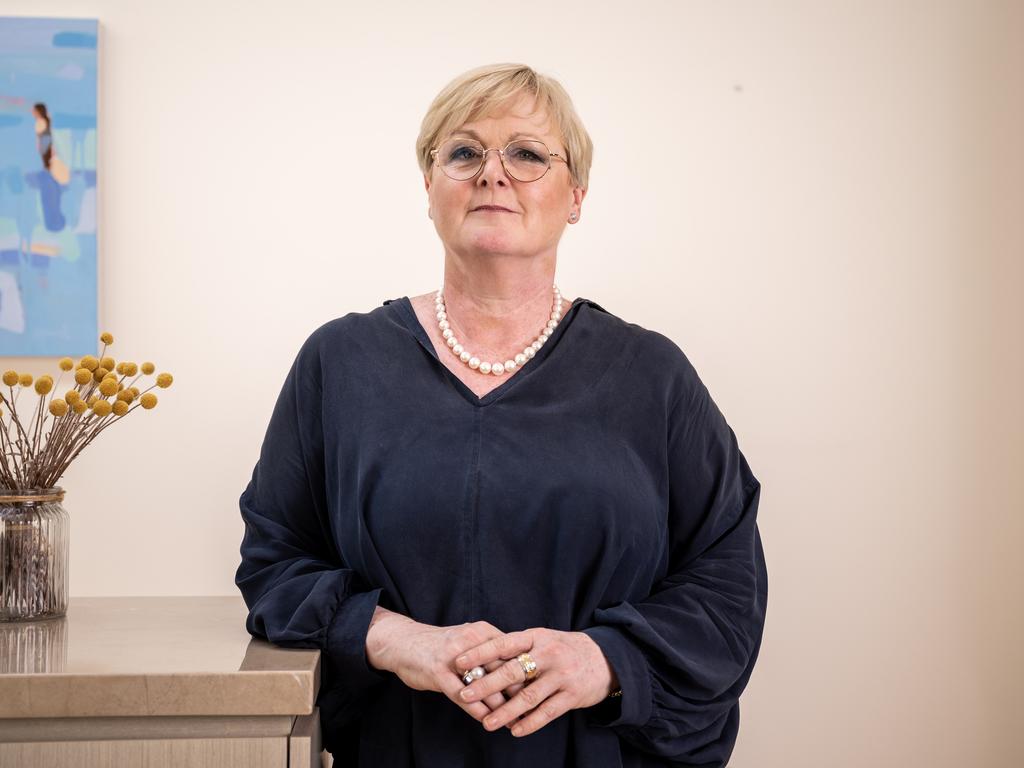Fiona Brown, Brittany Higgins’ former manager, reveals betrayal and backstabbing in Bruce Lehrmann rape claim saga
Fiona Brown feels betrayed. First by Brittany Higgins. Then by her own party. The forgotten victim in the sorry mess of the Higgins/Lehrmann rape saga breaks her silence.
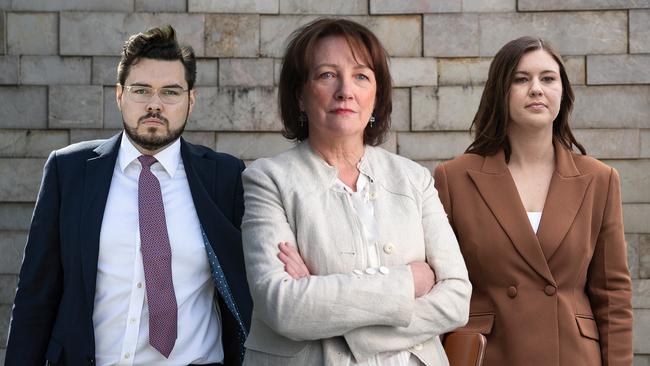
Fiona Brown feels betrayed. First by Brittany Higgins. Then by her own party. Then, most painfully, by a man she respected greatly: the former prime minister of Australia, Scott Morrison.
Brown is the forgotten victim in the sorry mess of the Higgins/Lehrmann rape saga, ruthlessly pursued by Labor to bolster its claim of a political cover-up, cast aside by her Liberal Party colleagues when she became, to them, a liability.
It left her, as she puts it, “the dead carcass on the road – you drive by and wonder what happened to it”.
The end of Brown’s long and distinguished career of public service arrived unexpectedly, on the evening of February 15, 2021, when she sat down with colleagues in the press office at Parliament House to watch Lisa Wilkinson’s much-hyped interview with Higgins.
One fellow staffer had warned her earlier: “It’s going to be brutal.”
“I thought – what did they know that I didn’t know?”
She had no idea she was about to take a starring role as a chief villain – second only to the alleged rapist – in the story Higgins told. But Bruce Lehrmann wasn’t named in the program. Brown was.
‘Why is she doing this?’
Higgins claimed Brown knew she had been raped in the office of then-minister Linda Reynolds; that Brown had viewed the CCTV footage from that night; that Brown had refused half a dozen requests from Higgins to see the footage; that Brown had not supported Higgins after that night, and in fact offered Higgins a “payout” to get her out of the way in the lead up to the election.
Brown was dumbstruck.
“The first time my name comes up, I go, ‘Oh, that’s a bit uncomfortable’; the second time; the third time, and I’m starting to feel really sick; and then the fourth time and all these things that are being said, I’m just going ‘what the f..k is going on here? This is not what happened. Why is she doing this?’
“It was like standing in front of a firing squad. And it was the day that my life ended, as I knew it. I just broke down and my colleagues around me had to witness me fall apart.
“The worst thing you can say about a woman is she walked past another woman’s rape.”
None of it was true, Brown says, not even the claim she had seen – or could somehow obtain – CCTV footage of Higgins and Lehrmann in Parliament House on the night.
“I never saw it. She never asked me for it. And even if you asked me today, how would I get it? I would have no idea.”
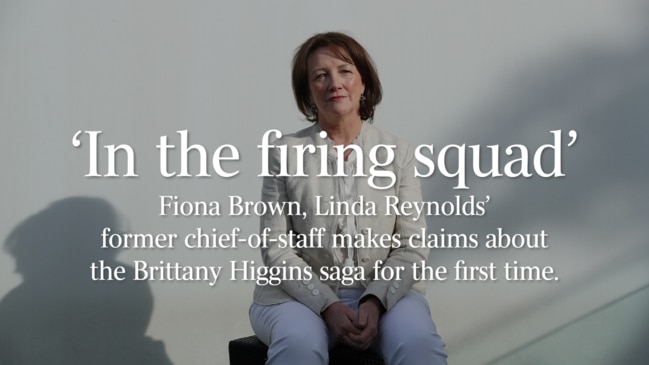
A colleague insisted on driving Brown home that night, “for which I was very grateful, because I thought I could drive but, frankly, I would have killed myself or killed somebody”.
Brown has kept her silence ever since.
When the politics of the rape claim and the cover-up allegation rocked the Morrison government, she remained quiet. Though she was targeted in parliament and in the media for months on end, she didn’t speak up.
She assured police that she would not speak to the media as she didn’t want to undermine a prosecution. They thanked her for that co-operation with the prosecutorial process. That judicial process is now over after the DPP abandoned a proposed re-trial, citing Higgins’ mental health.
During more than six hours of interviews with The Weekend Australian, Brown asks only one thing: that we view her story not through the lens of today, or of the day two years ago when Higgins went public with her claim of rape, but, rather, as she watched it unfold four years ago.
“I went to work one day. This is what happened to me. I’m not here to tell you what to think. I’m not here to defend. I’m not here to protect. I’m here just to tell you what happened to me when I went to work one day.”
‘Security breach’
Monday, March 25, 2019, was like any other busy day in the Parliament House office of defence industry minister Linda Reynolds, as far as Brown can recall now.
She was in Reynolds’ office on a three-week stint, on loan from the Prime Minister’s office to help the newly appointed minister settle in.
She knows she must have spoken to Higgins that day because she signed and certified a copy of her driver’s licence for some administrative paperwork.
“So she sees me and she says nothing, nothing,” says Brown, shaking her head, still bewildered more than four years on from the moment that changed her life.
It wasn’t until the next day, at 11.45am, that Brown got a call from Lauren Barons, an official with the Department of Finance – the agency responsible for Parliament House staffing arrangements – informing her that there had been a serious security breach in the minister’s office at the weekend.
There was little detail. Lehrmann and Higgins had made an unauthorised access of the office in the early hours of Saturday. Lehrmann had then left; Higgins had later been found naked on a couch by a security guard.
“I said, ‘Oh my God, what happened?’ Lauren said, ‘I don’t know.’ She said, ‘this is what you’ve got to do. These are serious security breaches.’”
The situation was outside anything either Brown or Barons had dealt with, but Brown followed the instructions she had been given.
She called Lehrmann in first.
The young staffer had previously committed a security breach over the mishandling of a sensitive document and was due to leave the job in coming days.
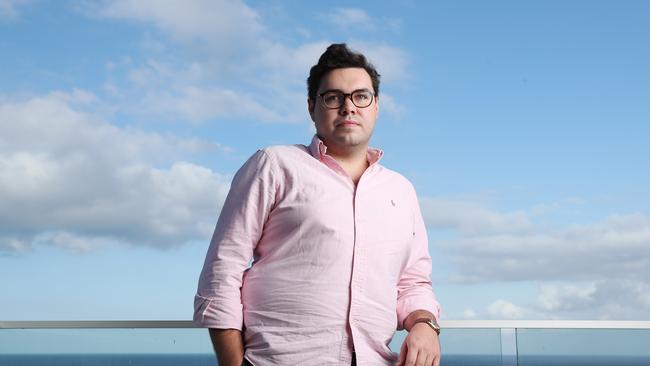
Tell me what happened, she asked. Why were you here? She recalls the conversation:
Lehrmann: I came to have a whisky.
Brown: Why would you come back for whisky at that time of night?
Lehrmann: Ah, people do it all the time.
Brown: Ah, no, I don’t think so.
“What was going on?” she says now. “I wasn’t sure, I didn’t have anything at that point.”
Lehrmann said the pair were not intoxicated.
Brown thought it was possible they’d had sex, but she had no idea of their relationship.
“It was none of my business,” she says. “For all I knew they were dating. I don’t get into people’s personal relationships … I’d only been there 10 days.”
She says she was trying to use neutral, non-leading questions, concerned that probing into their private life could be used against her. Brown says Barons had been very clear, over the phone, in her instructions: “You can’t put things in an accusatory tone to someone – you’ve got to let them tell you what happened.”
“I invite you to go back to that time frame,” Brown says now, “not two years later, after The Project interview. What I was dealing with was, I had a HR issue and a disciplinary issue.
“I told Bruce I was disappointed he didn’t disclose after-hours access to me because, of course, I’d seen him earlier. He’d said that that was wrong and he apologised.”
Lehrmann left the office immediately. “And then I took a few deep breaths and called Brittany in. I think she knew something was afoot, because when she walks in, she’s all very ha ha, and then she sees the paperwork on my desk. The employee assistance program (EAP) and the ministerial statement standards.”
Brown asked Higgins if she would like someone with her. Higgins said no.
Brown began: “I understand you came in after hours. Who did you come with? What did you do? Where did you go?”
Higgins told her she had been out drinking and recalled coming in through the Parliament House security checkpoint.
“I remember her saying she woke with her dress up around her. Now that was different to Lauren Barons telling me she was naked. And I said: ‘Is everything all right? Has something happened?’”
“No, I’m responsible for what I drink and my actions,” she recalls Higgins saying. “So I took a lot of comfort from what she was saying. She’d been on a night out. There was no allegation.
“After I talked to her, I said, ‘Look, you need to remind yourself of your responsibilities here.’ I said, ‘Remember, if you’re unhappy with something you have our support.’”
Again, Brown thought it was possible they’d had sex but didn’t feel she could make the accusation directly.
“I would have thought that was inappropriate. Like, they could complain about me, saying: how dare you say that to me.
“I have a responsibility to both. I can’t put ideas in anyone’s head. All I can do is provide a supportive environment. That’s why I kept using the phrase: has anything happened that you didn’t want to happen?”
‘Call the police’
Brown agrees she wanted Higgins to understand the seriousness of the security breach.
“This wasn’t a playground. This wasn’t a sandpit, this was the defence industry minister’s office and had we won the election and she chose to stay on, she had the opportunity to work in a defence minister’s office. That’s pretty serious shit. And the thing about young people in these jobs is that there are two types: those that take it very seriously and those who get drunk on power, and it corrupts them.” Lehrmann and Higgins were both in the latter category, she says.
“Bruce was a very hard worker, very smart. But, you know, a little drunk on the power, and immature; you know, the responsibility was disproportionate.
“But what we were finding is this bracket creep of young smart people who had enormous ability being given classifications beyond their ability to maturely deal with that and cope with that.”
Brown reported the meetings to Reynolds, who was travelling.
Wednesday passed without incident. Brown checked in with Higgins that she was OK and Higgins told her she was accessing the EAP program to which Brown had referred her.
But Higgins was away from the office much of the day.
“I was always chasing after her like I was her mother,” she says. “I texted her, I rang her, I checked in with her.”
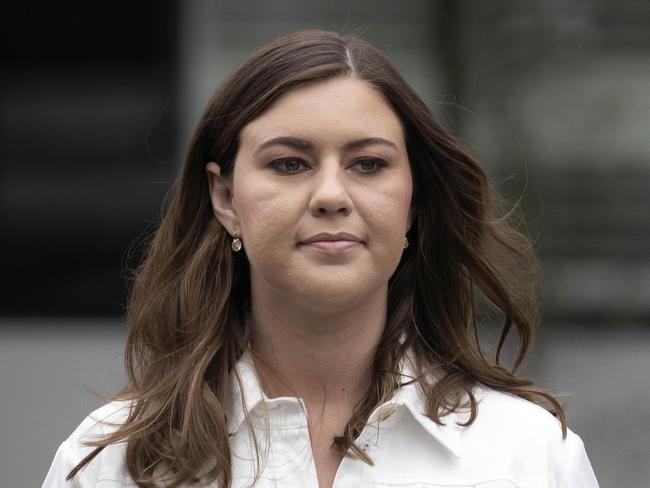
Brown was again following advice from the department not to harass, giving Higgins “space and respect”.
On the Thursday Higgins came into Brown’s office to return the signed statement of ministerial standards.
“So then I said to her, ‘Thanks very much. By the way, we’re always here. If anything comes to mind, you want to talk about anything.’ She says thanks. And then she’s walking out the door and she just pivots around and says, ‘Oh, I remember him on top of me.’
“And I thought ‘f..k’. And I said, ‘What?’
“I said, ‘Are you all right?’ And she’s just staring at me. And I said, ‘Did something happen that you didn’t want to have happen?’ I get up and walk over and I say: ‘Do you want to sit down? Can I get you a cup of tea?’ No. ‘A glass of water?’ No. ‘Would you like to make a complaint?’ And she shakes her head to say no and I go, ‘OK, what do I do with this?’
“That’s when she says ‘thanks’. She said she was taking the counselling and her father was coming down for the weekend. So I expected I would get a call if something had happened.”
Brown told Reynolds what Higgins had said. Reynolds rang Brown and told her go to the police to make a report. Brown thought that was untenable: “Am I supposed to go and accuse a young man of a criminal offence without the female telling me she was raped?”
The loyal public servant was willing to put her career on the line, and refuse a minister’s direction, rather than report a rape to the police without permission from Higgins.
“I rang Lauren. She said, ‘No, you can’t do that. You’ve got to give the woman agency. It’s her right as to making a report to police.’
“I said to Barons: ‘I might have to come to talk to you about my termination this afternoon. In my mind, she [Reynolds] was within her rights to sack me.”
But Barons confirmed in an email that Brown was taking “appropriate” steps to protect Higgins and that “ultimately any decision as to whether to lodge a police report or pursue any other form of complaint relating to this matter would be a personal choice of the person involved”.
Instead, on Friday afternoon, Brown rang Higgins to ask her if she wanted Brown to make a report to police on her behalf. Higgins said no.
The following week, on April 1, Reynolds and Brown met with Higgins.
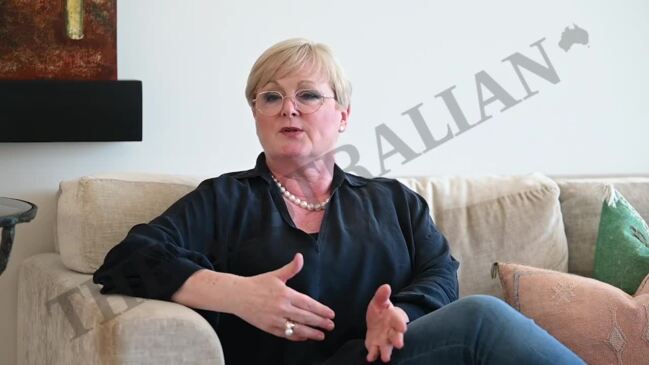
Brown had assured Higgins that Reynolds was “lovely, really nice”, and wanted to check on the young staffer. Even though Higgins had still not made any allegation of rape or assault, Reynolds suggested that the young woman speak to the police.
Brown found the phone number of the Australian Federal Police based in Parliament House and located the offices – in the basement, a rabbit warren of a place. It was Brown who phoned them and set up the meeting.
“I go down there, I find out where they are, I go back and I say [to Higgins] ‘I’ll come with you ‘cause it’s really hard to find. Would you like me to go in with you to have a support person?’ No. ‘Would you like me to wait outside?’ No. ‘Would you like to call me and I’ll come back and get you?’ No. ‘Could you let me know when you’re back?’ Yes.
“Then, about an hour and a half had passed, she hadn’t let me know. So I was panicked. Where is she? Is she all right? She was back in the office.”
When Brown asked how Higgins was, she said she was fine.
Two years later, in court, Higgins would say that days after this meeting, on Thursday, April 4, she went into an office bathroom for hours, crying from anxiety. That wasn’t true. She was at a long lunch, a farewell to her old boss Steven Ciobo.
The looming federal election soon consumed Brown’s attention. Higgins was asked if she wanted to work from the Gold Coast or go to Perth for the election campaign where Reynolds, a WA senator, would spend her time. Higgins decided to head to Perth, taking the white cocktail dress from the night of the alleged rape with her.
On June 7, 2019, after the re-election of the Morrison government, Higgins sent Brown a message: “I wanted to say this in person but – I cannot overstate how much I’ve valued your support and advice throughout this period. You’ve been absolutely incredible and I’m so appreciative.”
The Project bombshell
Brown asks us to imagine her disbelief and devastation when, less than two years after that warm thank you, Higgins appeared on national television to claim that, not only was she raped, but that Brown was complicit in the crime.
On The Project interview, Higgins said that Brown had walked past the rape of a young woman, that Brown had tried to cover it up, that Brown had tried to offer commonwealth funds to get Higgins out of the picture in the lead up to an election.
Shocking claims against any person, let alone a woman like Brown, who herself has experienced the deep trauma of domestic violence in a previous relationship.
“How could you think it was OK to do that to another human being?” she asks. “I’m a human being. I’m actually someone who cared for her. I worried about her.”
Brown can only guess at why Higgins chose to make these claims.
“She had to have a villain – apart from the rape in the office story – on the political conspiracy side that story needed a villain. She needed to present stuff as facts in order to justify or convey her feelings – and that’s why she did this to me – so I was the villain.”
Despite a long and distinguished career, many people outside of politics had never set eyes on Brown. She had worked for Ian Temby QC at the NSW ICAC, then moved into senior roles in the Greiner government, then federal politics advising then immigration minister Philip Ruddock.
After a stint working at Ernst & Young in London, Brown returned to politics, working with Arthur Sinodinos in John Howard’s office, then becoming chief of staff to Sinodinos when he became a senator. Brown’s most recent role was director of operations for prime minister Scott Morrison.
When the rape scandal broke, the media couldn’t locate a single photo or social media post of the understated, highly respected Brown.
Brown dealt with the fallout from the accusations the only way she knew how: she kept turning up for work. “I had no other way to communicate that I had done nothing wrong. I was just trying to survive.”
She describes the relentless trauma of what was unfolding around her in the aftermath of the rape accusations – TVs on 24/7 in the office, meetings behind closed doors where she knew she was being talked about, newspapers, radio covering it daily. Brown didn’t keep her mental health struggles private.
She asked for help from Morrison’s chief of staff, John Kunkel, and others. She started seeing a therapist.
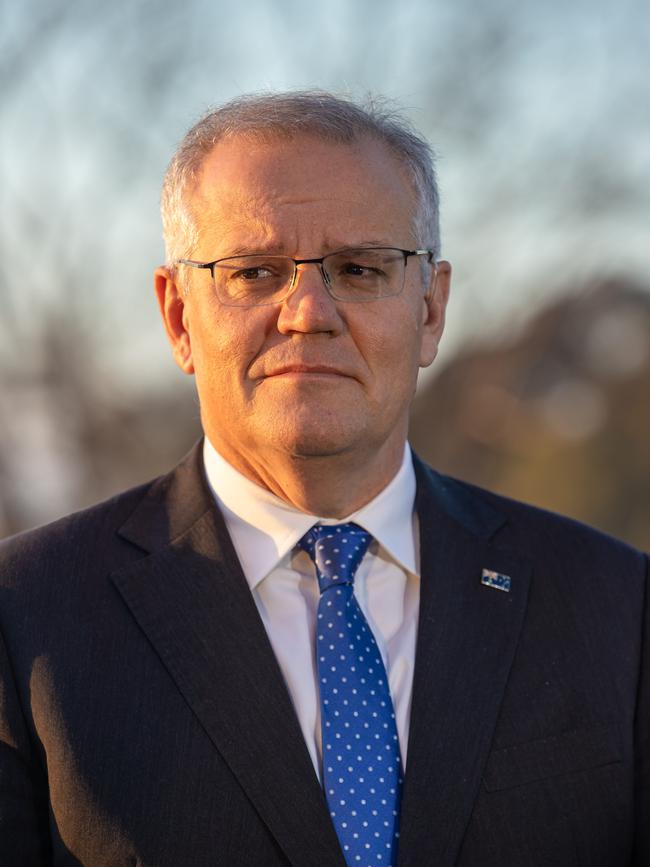
Brown found herself a pariah in her own office. “No one came out and disputed Higgins’ claims – I couldn’t, I wasn’t an MP.”
She wanted to take legal action against Ten for defamation but was told by senior people in PMO that a legal claim would just make the story bigger. And the #MeToo movement was in full swing.
“No one wanted to go against the movement,” she says. “It was such a febrile environment that for me to come out against Higgins – I was already being pilloried. They’d drawn the PMO into this and if I went to the media I would have exacerbated it.
“They didn’t think it was a good idea. It’ll run out of steam in two weeks,” they told her.
It didn’t. Brown’s career was disappearing before her eyes.
Work responsibilities were taken from her with no explanation. Some ministers wouldn’t even say hello.
She recalls former health minister Greg Hunt as a notable exception. “He was good – he genuinely cared how I was.”
To her surprise, no one came to her after The Project aired to ask if Higgins had told her she had been raped.
Certainly not the prime minister, she says.
‘We’ve spoken, right?’
Three days after The Project interview, Brown says the bullets kept coming. Only this time from the prime minister.
“I remember him coming back after question time on that Thursday … and for the first time he said: ‘How are you?”’ Brown recalls.
“He has never sat down or even walked by and had a proper discussion with me after the issue exploded. The most discussion I ever had with him was in that moment. That was the extent of it, a two-minute conversation: ‘Hi Fiona, how are you?’
“I said, ‘Oh, it’s pretty tough.’ And I apologised to him. I said, ‘I’m sorry they’re using me to get to you. I’m really sorry about that. But she never, never told me.
“And then the only thing he says in relation to this matter ever is: ‘We’ve spoken.’ That’s it.
“‘We’ve spoken, haven’t we’.” And then he walked off.
Earlier that afternoon, in question time, in response to questions from Anthony Albanese as to whether Morrison had spoken to Brown about threatening Higgins’ job, and not supporting her, Morrison told parliament that “I have had these conversations with the member of staff. I’m happy to indicate I have had conversations about the support provided by the member of my staff now. I have discussed with her those matters.”
A day or so later, Brown read Hansard. “That was it. I realised at that moment that I was collateral damage.”
Brown made a note to herself, once she read Hansard and realised precisely what the prime minister had said, given that he had never met with her about these events, “I was devastated. I felt grubby.”
“Could you imagine how it felt? I thought he genuinely came by to check how I was. I hadn’t really heard question time. And then when he came by, I was like, oh my God, he’s asking how I am. And then that comment triggered me and I went, huh?”
Brown says she told many people, including Kunkel, “he’s never spoken to me”.
Morrison told The Weekend Australian: “I understood my statement to be accurate to the House. I regularly saw Ms Brown in the office and would ask how she was going. Specifics of matters relating to the incident were the subject of many other processes that I did not seek to interfere with.”
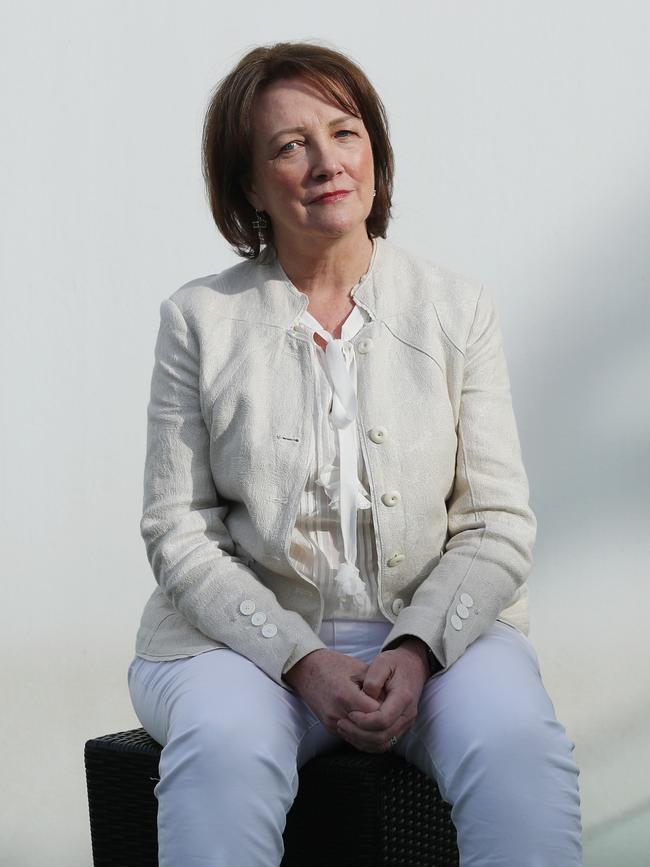
Morrison said he accepted that Brown may have had a different expectation about what such a conversation should have entailed, hence her recollection.
“I had not sat down with Ms Brown over these issues in the same way as I had with Ms Higgins,” he says. “I note the latter meeting was arranged at Ms Higgins’ request. I meant no disrespect or insensitivity to Ms Brown, as there were many competing issues I had to address as prime minister.
“Ms Brown continued to do an outstanding job in my office during a very stressful period and I am very appreciative of her contribution and professionalism.”
Brown says she had a mental breakdown.
“It was like a pillow over your face,” she says.
She says she didn’t keep those mental health struggles private. She asked people in her office for help. In her darkest moment she tried to take her own life.
She can remember the day she walked down a path to the beach.
“I sat on the bench there. It was like a black hole, a space, there’s nothing,” she says.
“I had decided I would swim out. I figured that if I drowned or got taken by a shark, it would be less traumatic for my family – they wouldn’t have to live with all the guilt that I killed myself.
“But a surfer came by and said are you OK? He grabbed my hand and then took me in.
“I sat on the beach and just bawled my eyes out.”
But Brown returned to the office. “If I left I thought they wouldn’t see me as a person. That’s why I’m so hurt by John [Kunkel]. I asked John, can you help me? I humiliated myself and said, can you help me? I watched other people get help from [from PMO] into new jobs. I didn’t expect to be an ambassador, I would have been an EA somewhere else.”
But Brown was not helped into a new job.
Why did her own work colleagues, right up to the prime minister, let her down so badly?
“They’re all fearful, they’re all scared. Everyone was out for themselves. Because no one wanted to be Fiona Brown.”
A year later, still turning up to work each day, the senior staffer would face another earthquake.
The PM’s apology
Brown wanted to go to the chamber on February 8, 2022.
It was the first sitting day and the prime minister was going to make a statement, as recommended in the Jenkins Review, to acknowledge the harassment, bullying and other poor behaviour to women in parliament.
Brown told colleagues: “I’d like to be there for that apology. I think that applies to me.” She was told it was a bad idea, and she knew that. The media would have lapped up the image of her and Higgins watching the PM.
She walked around to the press office instead and watched as the prime minister apologised to Higgins. “I’m sorry. We are sorry,” he said. “I am sorry to Ms Higgins for the terrible things that took place here.”
Brown was gobsmacked. The PM had not just thrown out the presumption of innocence for a man accused of rape. He had thrown her under the bus “and run over several times” when he effectively sided with Higgins’ claims about her mistreatment by Brown and Reynolds.
“I walked around to Kunkel’s office and I said to him: ‘This is a very sad day in Australia’s history.’ And he just looks at me. I didn’t mean him personally, but I said: ‘You’ve turned the parliament into a kangaroo court. You’ve just sentenced a young man for a crime that has not been prosecuted or proven.’
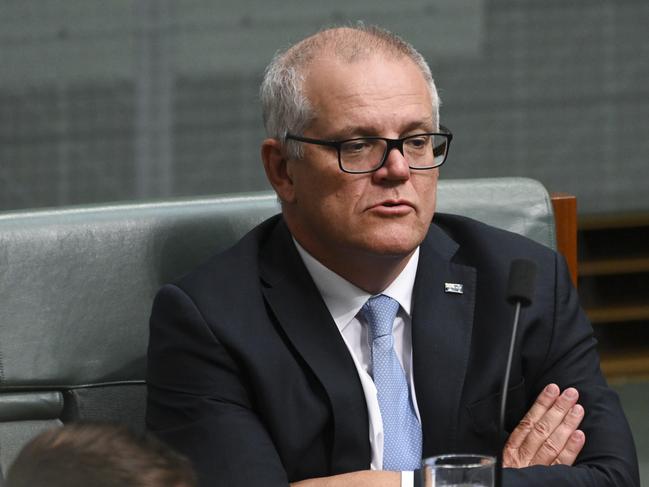
“I just stood there, then I walked out. He said nothing.
“It was one of the many times I went into the visitors’ bathroom, locked myself in and cried.
“He [the PM] had sentenced me without even talking to me. I was crushed. I was sentenced for being the perpetrator, ignoring a rape.”
Brown was equally distressed when Morrison met with Higgins. Brown had arrived at the prime ministerial offices in Sydney that day – and was told not to stay. The PM was meeting Higgins there.
Brown left the office.
“I watched it on the news,” she says. “Could you just imagine what the feeling was like that your boss gives someone else the time of day, but he doesn’t give you the time of day?”
If there was any small comfort for Brown in the days ahead, it was that Lehrmann’s trial was coming up and she had been called as a witness.
She would at last get a chance to tell her story.
The trial
True to form, Brown entered the ACT Supreme Court far from the heaving media pack, around the back, from Vernon Circle, Canberra’s famous ring road.
She took the stand in courtroom Number 3 at 10.41am on October 11.
Over the course of the day, until she was excused as a witness just after 2pm, the senior staffer would not be given the chance to counter the most serious allegations against her.
Brown could at least set the record straight about the CCTV footage when asked during cross-examination by Steven Whybrow whether she had ever seen the footage of Higgins walking into Parliament House in the early hours of March 23, 2019.
Brown was emphatic. “I’ve never seen the footage.”
Did the CCTV footage ever come up in conversation? “No. Never.”
In yet another twist, Higgins would see the footage before Brown, when AFP Detective Superintendent Scott Moller agreed to show her it after her persistent requests in the lead up to the trial.
Brown saw the controversial footage for the first time when it was shown on the Seven Network’s Spotlight interview with Lehrmann last Sunday night.
The CCTV footage shows Higgins smiling and skipping through the corridor after she has gone through security, with little sign of the high level of drunkenness she had claimed.
The trial also allowed Brown to explain her support for Higgins. She recounted how she asked Higgins during the first meeting: “Are you OK? Has something happened that you didn’t want to happen?”
Just before the trial paused for lunch, Brown broke down in tears when Whybrow read out the text message that Higgins had sent her former boss thanking her for her support.
After Brown was excused, and the jury left the room, Whybrow told the Chief Justice that Higgins had deleted the text from her phone.
Brown says hearing Higgins’ text, recognising her support for the young woman, was a “reminder” of that time compared to where Brown found herself 2½ years later, portrayed and persecuted as a villain.
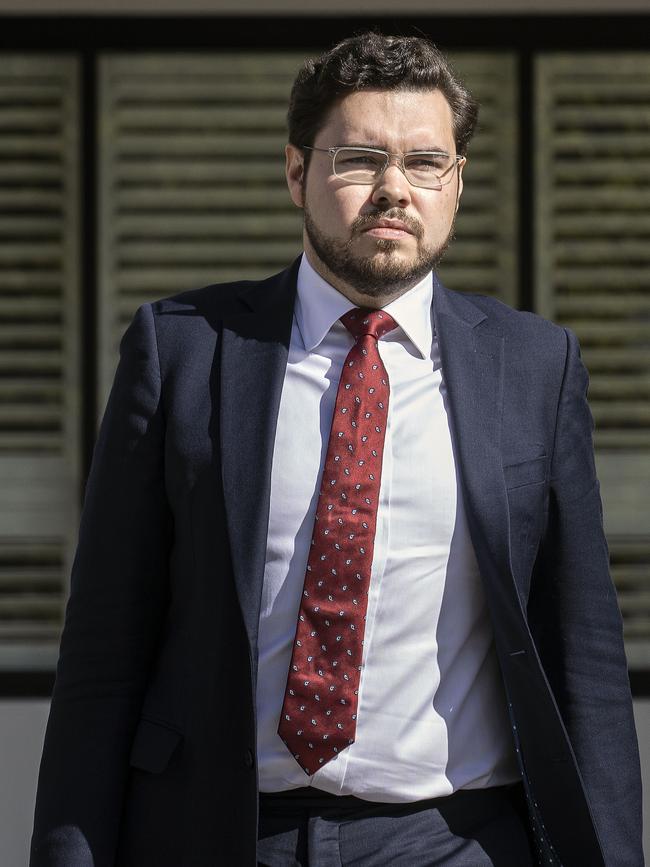
“It was jarring, it was so obvious that the chasm between the two [periods in her life] was so deep,” she says.
When Higgins returned to the stand, on October 14, having a break for mental health reasons, she told the jury that Brown and Reynolds said “they would pay me out the entirety of the election to go to the Gold Coast, but that … I would never have a job again”.
Brown was distressed by what she says was a false assertion by Higgins that she had been induced by an offer of public funds by Brown. “I felt that was an accusation of corruption.”
But once again, Brown was denied the ability to correct the record. She emailed the DPP’s office that same day, pointing out that she had been misrepresented by Higgins. Brown wanted her to be recalled. She didn’t receive a reply.
Six months later, the Sofronoff Inquiry would hear that Brown’s email pointing out the discrepancy was never disclosed to Whybrow, meaning the defence was not given the chance to recall Brown.
During the board of inquiry into the ACT justice system’s handling of the Lehrmann/Higgins matter, Whybrow described Brown as “the most important witness in this case because she’s the only person that had taken contemporaneous notes of what happened”.
Worse was to come for Brown. During his closing remarks, the DPP used Brown’s breakdown in the witness box against her, implying some kind of guilt.
Higgins had every reason to fear political forces conspiring against her, the DPP told the jury. The implication was that Brown had something to hide.
Brown watched reports of the DPPs closing on live feeds in the media.
“He just sought to discredit me in every way,” she says. “When I heard that statement, I felt like another person had thrown me under the bus and I didn’t think there was much left of me by that stage.”
She wasn’t invested in Higgins or Lehrmann – “I’d always seen myself as Switzerland. I just wanted the truth – I just wanted to be a good witness. I wanted to do the right thing.”
Brown felt so let down by how the DPP behaved towards her that she complained to the ACT Bar Association, and she has lodged a statement with the Sofronoff Inquiry.
Asked about Brown’s claim Higgins lied, a spokesman for Higgins referred The Weekend Australian to the court transcript for her statements about Brown’s involvement, noting that Higgins’ evidence was given under oath.
The terrible things
Brown has received half-baked apologies from some media outlets, including ARN over a Jonesy and Amanda segment after The Logies, and from Nine over The Logies where Brown was once again defamed.
For Brown, it’s not enough.
Acres of newsprint have been given over to the destructive impact the case has had on the two young people at the centre of it, Brittany Higgins and Bruce Lehrmann.
Brown reminds us that the lives of two older women – hers and Senator Reynolds’ – have also been irrevocably damaged.
“This has destroyed my life, my career, my livelihood,” she says simply.
Brown is no longer a political staffer. “I’m just trying to get my life back together,” she says.
She regrets not speaking up sooner, but she had been determined to do the right thing at every stage: following departmental advice, taking Higgins to the police, offering support, absorbing the blows in the media and in parliament in silence, going along with the prime minister’s ruse that he had spoken to her, watching as the PM jumped on board the #metoo juggernaut and chose to save his own skin at the expense of hers.
If there was anyone who owed her an apology, who would it be?
There’s a long pause.
“Wow”, she says finally. “Imagine if you’ve got an apology from Brittany Higgins. Don’t think that’s ever going to happen.”
Would she like that?
“It’s a raw question because I’m still processing that. I don’t think I’d ever be able to get a sincere apology from her.”
There’s another long pause as she’s reminded of the words with which her old boss condemned her, in the building that was once her life.
“And an apology from the Prime Minister and the former prime minister for the terrible things that happened to me in that place.”


